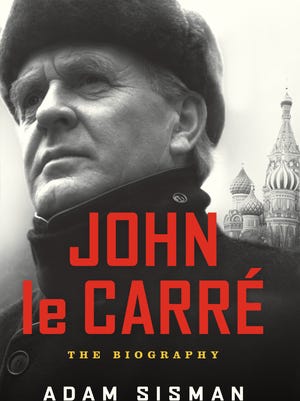John le Carre: The man behind the spies

Biographies about writers, no matter how high their subjects sit upon Mount Immortality, are, in essence, dubious propositions in large part because, well, they’re writers.
The most interesting things they do with their lives involve sitting at their desks while pulling things out of their heads and putting them on a blank page. The rest is either as mundane as going to one’s mailbox or the dry cleaner or somehow more squalid and less inspiring than the stories they tell or the words they string together.
Such endeavors are even dicier when it comes to writers who are still active, partly because of loose threads biographers can’t easily untangle when their main characters remain among the living.
Yet loose threads are what fascinate most about Adam Sisman’s biography of David Cornwell, who at 84 still writes and publishes knotty, brainy thrillers under the pseudonym John le Carré. Those picking up Sisman’s book expecting to peek under the cloak of the man behind such espionage classics as The Spy Who Came in From the Cold, Tinker Tailor Soldier Spy, The Little Drummer Girl and The Russia House may find that the more one learns about Cornwell, the more cloaks there are that need peeling away.
Much about John le Carré: The Biography, especially its early pages, will be familiar to those who’ve read the 1986 autobiographical novel, A Perfect Spy. Its star-crossed secret agent protagonist Magnus Pym had a brash, shamelessly ingratiating con man for a father very much like the real-life Ronnie Cornwell, who, as David’s older brother Tony said, “could rob and love you at the same time.” Ronnie’s misadventures, which frequently landed him in the pokey, were too much for David and Tony’s mother, Olive. She left home when the boys were young, apparently leaving David with a lifelong mistrust of women who in his mind remained “people who disappeared without explanation, not to be relied upon.”
David Cornwell also remained ambivalent about his father, but in later years conceded that “Ronnie, in his own way, had been as much an addict to the process of artistic creation as (le Carré) had been himself.”
Indeed, the theme of artifice vs. reality is a subtext to Sisman’s biography. When, for instance, The Spy Who Came in From the Cold was published in 1963 and became an international best seller, “John le Carré’s” true identity as a onetime officer and agent runner for MI-5 (domestic British intelligence) and MI-6 (foreign intelligence for Britain) was concealed for a time. And while Sisman describes Cornwell’s duties in those intelligence services, he concedes in his introduction that Cornwell “has been reluctant to talk to me in detail” about the things he did as an agent, even more than half-a-century after the fact.
But John le Carré more than compensates for such gaps with detailed accounts of Cornwell’s first marriage; his chaotic involvement in a ménage a trois that included the late, self-destructive novelist James Kennaway and his wife Suzanne (the inspiration for le Carré’s 1971 non-spy novel, The Naïve and Sentimental Lover); his late-in-life belief that western nations “have squandered the peace that we won with the end of the Cold War”; and the progressive politics animating such recent novels as The Constant Gardener and A Most Wanted Man, both of which became critically acclaimed movies.
Best of all, Sisman provides aficionados of le Carré’s fiction with canny assessments of, and inside information on all his written work. He discloses, for instance, that George Smiley, the hero spymaster of Tinker Tailor Soldier Spy and other books, has at least two real-life inspirations, including to some extent le Carré himself. “To turn real people into fictional characters,” le Carré says, “we have to supplement our limited understanding of them with bits of ourselves.”
John le Carré: The Biography
By Adam Sisman
HarperCollins, 652 pp.
3.5 stars out of four